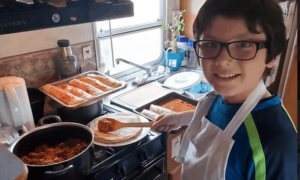Listening to Learn: The Impact of Tuning In

Monica Brady-Myerov
You go to school to learn how to read, write and do arithmetic. But the one skill you come in with, listening, loses importance over time as you build on your reading and writing skills. In fact, teaching tools that address listening are virtually nonexistent in the K-12 classroom. Listening as a skill is almost entirely absent from the curriculum. And yet, research shows only 10% of us listen effectively. Clearly there’s a disconnect.
If students graduated from high school and only 10% could read well, there would be an education revolution. There is agreement among business leaders, politicians and educators that communicating effectively, which includes listening and speaking, is a key 21st-century skill. In fact, we spend the majority of our time listening, not reading, writing or doing math problems.
The new Common Core standards have recognized the importance of this skill. The Common Core seeks to improve students’ skills and knowledge across a wide spectrum of learning skills. And for the first time in the history of education, it elevates listening to an anchor skill, cutting across the curriculum and applicable in kindergarten through 12th grade. The Speaking and Listening Standard requires students, among other skills, to interpret information from diverse media formats and delineate specific arguments and claims.
I know how to listen. As a public radio reporter, most recently at WBUR in Boston, it was my job to listen. I listened to politicians make their case in press conferences. I listened to lawyers make arguments in court. I listened to families devastated by drug abuse. Then I synthesized their stories and wrote about them so other people could listen. I instinctively knew that if I told a good story, used compelling, emotional voices from the interviews, people would listen.
Now, as the founder of Listenwise, a website that curates public radio and readies it for the classroom with wrap around lesson plans, I am trying to impart what I know about listening to teachers and students. What I’ve learned is that my instinct is correct. If you tell a good story, people listen better. Research out of Hebrew University proves this.
I also know that you can improve your listening abilities. Like anything else that involves brain synapses, the more you practice the better you become. Making your brain practice listening, according to one study, by using techniques and good principles of listening, will help.
How do you improve listening? Most of the research around listening is related to learning a second language, not to becoming a better listener in your native language. But there’s much to learn from these studies. One research study examines how a listener uses cognitive listening strategies to make sense of what they are hearing and metacognitive listening strategies to monitor the process of listening. Am I still listening? How do I get back on track? How do I understand that word? In the paper, Laura Januski PhD says a cognitive strategy might just be for the listener to grasp the main point of the story. A metacognitive strategy would be to check perceptions during listening to assess understanding.
There is no accurate instrument to measure listening in your first language, according to Janusik. There is a tool that measures listening to English as a second language, but it is focused on thinking about and responding to a second language. Without a tool to measure where we are and how we can get better, how will we improve listening?
We must work to build better listening measures so we can build better listeners.
For more on listening, check out:

Monica Brady-Myerov is Founder & CEO of Listenwise and a long time public radio reporter, most recently with WBUR. Monica tweets with @bradymyerov.




Susan Balogh
Dear Monica,
Well-said! Perhaps if we all valued listening more, we would have fewer conflicts. Perhaps we would cultivate a more civil society. Perhaps we would learn to delay gratification and subjugate our impulses for the common good, and to save face in the meantime.
Listening is undervalued yet vital to effective communication. To illustrate that point, I always recite for my students a little poem I learned as a child from my Aunt Mary. She was my father's oldest sibling, and a powerful yet quiet woman who almost single-handedly rescued my dad and seven other siblings from the grips of the Great Depression. My immigrant grandparents were struggling, and it was my Aunt Mary who listened to them, translated for them and negotiated with their bank so they would not lose their fledgling business. This she managed as a teenager! Then she went on to join the service and had a distinguished career in the US Navy.
The ditty goes like this: "A wise old owl lived in an oak. The more he saw, the less he spoke. The less he spoke, the more he heard, Why can't I be like that old bird?"
When we cut the chatter, we open the mind. Go ListenCurrent!